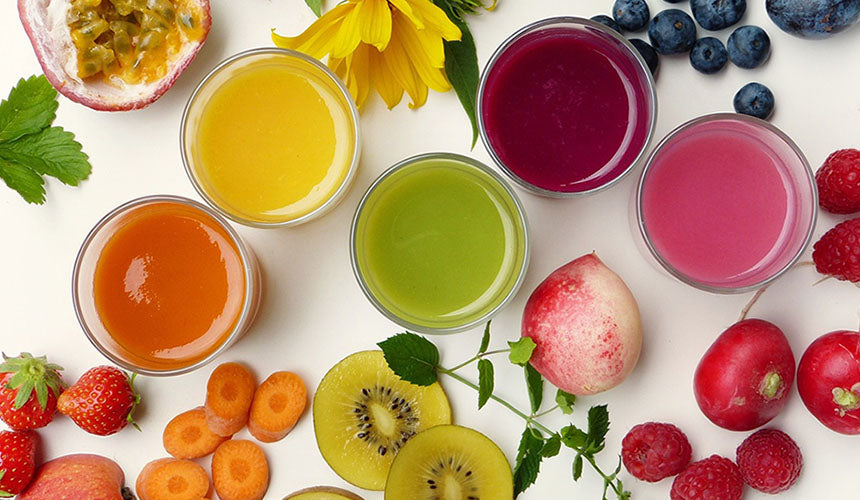** Despite the fact that there are many foods to avoid, there is an abundance to choose from to create healthy, satisfying, and delicious meals.
Fruits and vegetables are anti-inflammatory all-stars. The following foods and food groups are packed with nutrients that prevent or reduce inflammation. So eat up!
ALLIUM VEGETABLES
What's not to love? Onions, garlic, shallots, scallions, ramps, and chives offer a host of anti-inflammatory benefits. Onions, for example, are a rich source of anti-inflammatory vitamin C and quercetin, which can help relieve allergy symptoms. Onions also contain onionin A - a molecule that targets the immune system to prevent unwanted inflammation. Garlic is no slouch either. It contains a range of sulfurous compounds that reduce inflammation throughout the body, plus it has antiviral and antibacterial properties.
BASIL
Skip the aspirin. Eugenol, a volatile oil found in basil, inhibits the enzymes that produce inflammation, the same enzymes targeted by NSAID pain relievers.
BERRIES
Sweet! Blueberries, raspberries, blackberries, and strawberries are potent sources of antioxidants that combat cellular damage and inhibit the enzymes that produce inflammation.
BONE BROTH
Comfort in a bowl! Bone broth (Basic Chicken Broth), prepared with organic animals bones, simmered for at least several hours, contains glycine, proline, and arginine - essential amino acids. It also helps support the digestive tract by bringing digestive juices to the gut, and reduces joint pain.
COCONUT OIL and EXTRA-VIRGIN OLIVE OIL
Remember, don't fear healthy fats. Coconut oil is healthy, saturated fat that is especially high in lauric acid, which enriches brain function and the immune system. It's easily digested and used immediately for energy, rather than being stored as fat. Extra-virgin olive oil contains numerous polyphenol that reduce the chemical messengers and enzymes that lead to inflammation.
CRUCIFEROUS VEGETABLES
Lending crucial crunch, this vegetable family includes broccoli, Brussels, sprouts, cabbage, cauliflower, and kale. These vegetables have special sulfur-containing phytonutrients that help the liver filter toxins and neutralize carcinogens. Studies also show that eating these veggies lowers inflammation levels in the body.
DARK LEAFY GREENS
Both delicious and versatile, these vegetables contain the antioxidant vitamins A, C, E, and K, which help combat cellular damage that can contribute to inflammation. They are also great sources of anti-inflammatory omega 3- fatty acids and B vitamins, which help manage stress and nourish the nervous system.
DILL
This aromatic herb helps neutralize carcinogens, and is helpful in treating digestive problems like gas, indigestion, and constipation.
FENNEL
This sweet vegetable contains a number of anti-inflammatory phytonutrients, but is especially high in a compound called anethole. This phytonutrient has anti-inflammatory and anti-cancer properties, and works to shut down the signaling process that triggers inflammation. Fennel also contains antioxidants and immune - boosting nutrients.
FISH
Wild salmon, sardines, anchovies, mackerel, and halibut are wonderful sources of anti-inflammatory omega 3- fatty acids. Salmon, in particular, is high in two omega 3s called EPA and DHA, which help our bodies produce anti-inflammatory molecules. While looking out for your health with healthy food choices, remember to look out for the ocean's health, too. Choose seafood that is sustainably caught.
GINGER
Spice things up. This spicy root contains anti-inflammatory compounds called gingerols, which inhibit pro-inflammatory molecules. Ginger is used to treat a wide variety of conditions, including digestive issues, nausea, motion sickness, arthritis, headaches, colds, and flus.
GLUTEN-FREE GRAINS
Gluten-free does not mean grain-free. Grains such as quinoa, brown rice, and millet play a unique role in an anti-inflammatory diet. Quinoa is a complete plant-based source of protein, which means it has the same amino-acids found in animal products. It's also a rich source of magnesium, a relaxant mineral that reduces inflammation, and the anti-inflammatory vitamin E. Brown rice is another grain high in magnesium, along with the antioxidant selenium, which helps detoxify and protect cells from damage.
NATURALS SWEETENERS
Go natural. While refined white sugars are inflammatory, there are a couple of natural sweeteners that can be used in an anti-inflammatory diet. Raw honey is rich in healing amino-acids, digestive enzymes, and antiviral constituents. This means it helps enhance the immune system. Maple syrup is rich in antioxidants, plus it's high in zinc, another important nutrient for immune system. Of course, the use of natural sugars is completely optional if you 'd prefer to avoid sweeteners entirely.
NUTS and SEEDS
Snack on. These contain a wide range of healthy fats, protein, and fiber. Walnuts, hemp, chia, and flaxseed are particularly high in omega 3- fatty acids that help combat inflammation.
PINEAPPLE
Juicy! The core and stem of this tropical fruit contains a substance called bromelain, which reduces inflammation and helps us digest protein.
ROOT VEGETABLES
Earthy and satisfying carrots, sweet potatoes, parsnips, turnips, celery root, rutabaga, and beets are all anti-inflammatory and antioxidant powerhouses. For example, both carrots and sweet potatoes are rich sources of vitamin A, which helps nourish the mucosal cells in the digestive tract, aids vision, boosts the immune system, and keeps skin healthy. Sweet potatoes contain anthocyanin pigments and beets are full of compounds called betalains, which both reduce the production of inflammatory enzymes.
SUSTAINABLE ORGANIC MEAT
Meat is not off limits. Chicken and turkey are both high in protein, which is essential for healing and repairing inflammation. These animal products are also rich in B vitamins, particularly B12, a key nutrient for the nervous system that is found rarely in plants.
TURMERIC
Flavorful healing. Turmeric's anti-inflammatory power stems from its high levels of curcumin, which can help reduce inflammation associated with inflammatory bowel disease, arthritis, cystic fibrosis, and cancer.
WINTER SQUASHES
Beautiful to behold, winter squashes contain high amounts of vitamins C and A, similar to root vegetables. They also contain special compounds called cucurbitacins, which inhibit the enzymes that lead to inflammation.

